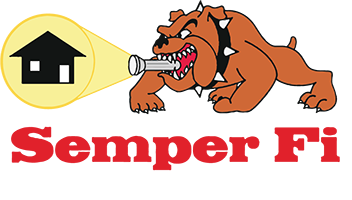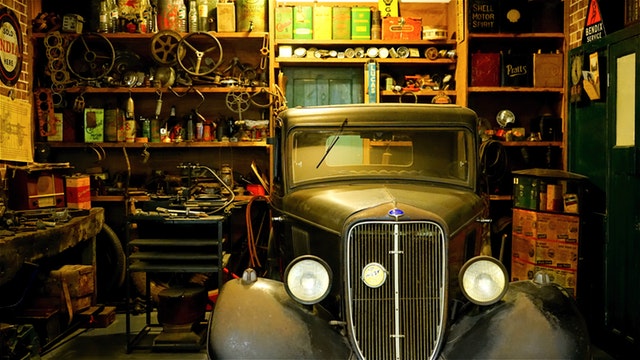Did you know … It’s not uncommon for house fires to start in the garage.
One of the most common reasons for fires to start in the garage: vehicles and outdoor equipment often contain fuel and other flammable liquids, and in most cases these are stored in the garage. Your vehicle engine can leak oil, or sometimes fuel, which can accumulate unnoticed and possibly eventually ignite. Under certain circumstances, your vehicle battery can spark, which could ignite any fumes that may be lingering in the enclosed space of your garage.
Paint, extra gas, motor oil and other potentially flammable items including things like brake fluid and paint thinner are also often stored in garages.
Additionally, hot water heaters and boilers are quite often housed in the garage, and can sometimes produce sparks, or have issues with their pilot lights if they are gas appliances, that could ignite fumes or liquids.
Here are tips to help prevent and limit fires in the garage:
Some of these items are checked during a standard home inspection, which is always a great way to protect your peace of mind before you purchase a home; or during an annual home maintenance inspection which provides you ongoing peace of mind as you continue to live in your home. Some are items you can take care of yourself. Even though you would have had a home inspection when you purchased your house, you will want to regularly check some of these items regularly to make sure you keep your garage as safe as possible.
Inspect the garage door.
Make sure all of the components are working properly. Not only does this provide you extra convenience, but can benefit your safety.
A faulty garage door opener system could potentially spark, which could ignite any fumes that may be present in the garage. A metal garage door that is warped and rubbing against a metal frame could also cause a spark with similar consequences.
Does your garage have attic access?
If so, make sure a latch keeps the attic door closed. This can help make sure that any flammable fumes that may be lingering in the garage do not gain access to the rest of the home, and also could help act as a barrier in case of a fire to prevent flames from spreading to the rest of the house as quickly as would otherwise happen if this door were open.
The sheetrock used on the walls and ceilings should be fire rated.
This isn’t always easy to determine as a homeowner, but a knowledgeable home inspector can examine the walls and ceiling to make sure they are adequate flame barriers.
Have proper and functional lighting.
Make sure lightbulbs are the proper wattage, and take care that you are not accidentally overloading electrical outlets by plugging in too many high-powered items.
Keep the floor area free of any clutter.
Loose papers, dropped unused matches, greasy towels, and other materials that are highly flammable are dangerous if they are cluttered in the garage. In some instances, items like these can spontaneously combust – without coming into contact with any type of flame source. Keeping a tidy floor also helps prevent trips and falls.
Tape down any cords and wires.
This helps keep wire and cords from accidentally being unplugged, from being bent and distorted to the point of breakage and potential fire hazard. As a bonus, having cords taped helps keep them from being a tripping hazard.
Properly store all chemicals.
If you do store any liquids or chemicals, make sure they are stored in clearly labeled, self-closing containers. Only store limited quantities, and keep everything away from sources of heat and flames such as heaters, hot water heaters, pilot lights.
Never keep propane gas tanks indoors.
Once they catch fire, propane tanks are prone to exploding. An explosion outside is frightening and dangerous, but it would be even more so inside your house. Propane tanks are sturdy and designed to be safely stored outdoors.
Interior doors in garages
If your garage includes a door that leads directly into your living area, there are a few specific guidelines:
Do not install a pet door on these garage to interior doors. If a fire were to begin in the garage, it is more easily spread to your living areas through a pet door, especially if it is made of plastic.
Does the door have a window? Such a window needs to be fire rated, or you face the same issue as with a pet door. A professional home inspector can inspect the window to tell if it’s fire rated.
The door should be self-closing. While some people may find this inconvenient, especially when carrying groceries, bags or boxes from your vehicle to inside, it is safest to have this garage-to-interior door be self-closing. Because fires can rarely be predicted, leaving this door open accidentally leaves your living space wide open in the event of a fire starting in the garage. Even without a fire, accidentally leaving this door wide open allows any fumes in the garage to permeate the rest of the house.
Inspect the joints and open areas all around the doorway. Any cracks can allow dangerous fumes, including fuel vapor, carbon monoxide, or fumes from any chemicals, to enter your living area.
And remember, if you’re buying a new build home, the best time to inspect some of these garage components is to have an inspection during construction.
For commercial property inspections in the Dallas/Fort Worth area, including a thorough and informative home inspection report, learn more at
or request a quote for a commercial inspection at
682-351-2267



